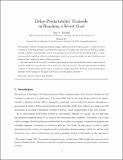Delay-Predictability Trade-offs in Reaching a Secret Goal
Author(s)
Tsitsiklis, John N; Xu, Kuang
DownloadAccepted version (374.8Kb)
Terms of use
Metadata
Show full item recordAbstract
We formulate a model of sequential decision making, dubbed the Goal Prediction game, to study the extent to which an overseeing adversary can predict the final goal of an agent who tries to reach that goal quickly, through a sequence of intermediate actions. Our formulation is motivated by the increasing ubiquity of large-scale surveillance and data collection infrastructures, which can be used to predict an agent's intentions and future actions, despite the agent's desire for privacy. Our main result shows that with a carefully chosen agent strategy, the probability that the agent's goal is correctly predicted by an adversary can be made inversely proportional to the time that the agent is willing to spend in reaching the goal, but cannot be made any smaller than that. Moreover, this characterization depends on the topology of the agent's state space only through its diameter.
Date issued
2018-04Department
Massachusetts Institute of Technology. Laboratory for Information and Decision SystemsJournal
Operations Research
Publisher
Institute for Operations Research and the Management Sciences (INFORMS)
Citation
Tsitsiklis, John N. and Kuang Xu. "Delay-Predictability Trade-offs in Reaching a Secret Goal." Operations Research 66, 2 (April 2018): ii-iv, 301-596 © 2018 INFORMS
Version: Author's final manuscript
ISSN
0030-364X
1526-5463